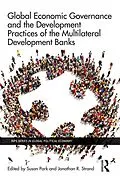As pillars of the post-1945 international economic system the Regional and Sub-Regional Development Banks (RSDBs) have long been considered mini-World Banks, reiterating the policy approach of the largest official multilateral development lender in the world. The main objective of the collection is to identify what role the RSDBs play in global economic governance and why.
This edited collection draws together cutting edge original research on these understudied institutions. In the burgeoning sub-field of global economic governance as well as the broader study of international organisations (IOs), too often the focus remains on the World Bank and the International Monetary Fund (IMF). Second-order IOs, such as the RSDBs, receive much less attention despite their longevity and regional importance. This volume corrects this oversight by bringing together methodologically diverse research on the RSDBs that interrogates the role and impact of these organisations in global economic governance. The book investigates: the African Development Bank (AfDB); the Asian Development Bank (AsDB); the Inter-American Development Bank (IDB), and the European Bank for Reconstruction and Development (EBRD) and select sub-regional development banks in comparison to the World Bank Group.
This work will be of great interest to students and scholars of IPE, IR and Development Studies.
Autorentext
Susan Park is an Associate Professor in International Relations at the University of Sydney. Susan has been a Visiting Scholar at George Washington University, the London School of Economics, at American University and a Visiting Scholar at the Centennial Centre for Political Science and Public Affairs in Washington, DC.
Jonathan R. Strand is an Associate Professor of Political Science at the University of Nevada, Las Vegas. Previously he taught at Niagara University and held a research position at the United Nations University's Institute of Advanced Studies (Japan).
Inhalt
Part One: Explaining the Policies of the MDBs
Chapter One: Susan Park (University of Sydney) and Jonathan R. Strand (University of Nevada Las Vegas), Global Economic Governance and the Development Practices of the Multilateral Development Banks
Chapter Two: Karen Mingst (University of Kentucky), The African Development Bank: Innovator or Follower?
Chapter Three: Yasumasa Komori (Michigan State University), The Asian Development Bank: Promoting Good Governance and Anticorruption?
Chapter Four: Kenneth J. Retzl (University of Nevada, Las Vegas), The Inter-American Development Bank and the Millennium Development Goals
Chapter Five: Anders Uhlin (Lund University), Civil Society and the Liberalization of the Asian Development Bank
Chapter Six: Stuart Shields (Manchester University), The European Bank for Reconstruction and Development building Warsaw on the Nile: Lessons from Eastern Central Europe for Egypt's transition.
Part Two: The Role of the MDBs in the International Political Economy
Chapter Seven: Jonathan R. Strand (University of Nevada Las Vegas), Implications of Accommodating Rising Powers for the Regional Development Banks
Chapter Eight: Chris Humphries (University of Zurich), Hassle Factor and Governance: How Non-Financial Costs of MDB Lending are Shaped by Voting Power
Chapter Nine: Daniel Braaten (Texas Lutheran University), Human Rights and the MDBs
Chapter Ten: Tina Zappile (Richard Stockton College), Beyond the World Bank and Regional Development Banks: Sub-Regional Development Banks
Chapter Eleven: Jonathan R. Strand (as above) and Susan Park (as above): The RSDBs in the Twenty-First Century
